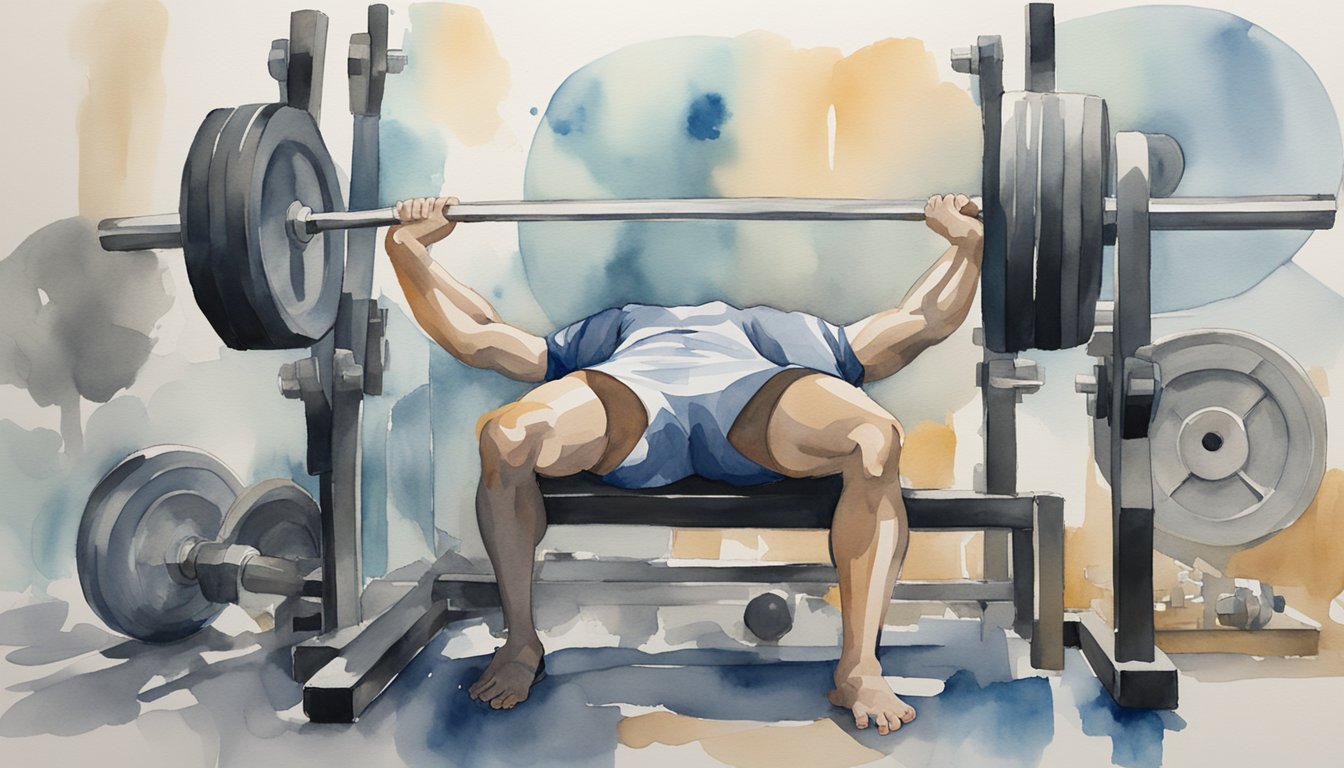11 Signs You’re Overtraining and How to Recover: Urgent Warning for Fitness Enthusiasts

Are you pushing yourself too hard at the gym? Exercise is great for your health, but overdoing it can backfire.
Many fitness enthusiasts don’t realize they’re overtraining until it’s too late. Knowing the warning signs of overtraining can help you avoid burnout and injury.

You may think more exercise is always better, but that’s not true.
Your body needs time to recover between workouts.
Ignoring rest days can lead to decreased performance, constant fatigue, and even illness.
Learn how to spot overtraining symptoms and get your fitness routine back on track.
1) Chronic fatigue
Feeling tired all the time is a key sign of overtraining.
You may find yourself exhausted even after a full night’s sleep.
This constant tiredness can affect your daily life and workouts.
Your body needs time to recover between exercise sessions.
When you train too much, you don’t give it enough rest.
This can lead to ongoing fatigue that doesn’t go away with normal rest.
You might notice you lack energy for simple tasks.
Getting out of bed may feel like a chore.
Your usual activities might seem more difficult than before.
Chronic fatigue can also impact your mood.
You may feel irritable or less motivated to do things you usually enjoy.
This is your body’s way of telling you it needs a break.
If you’re experiencing persistent tiredness, it’s important to listen to your body.
Take a step back from your intense training schedule.
Give yourself extra rest days and focus on gentle activities like stretching or walking.
Make sure you’re eating enough to fuel your workouts.
Proper nutrition can help combat fatigue.
Aim for a balanced diet with plenty of protein, complex carbs, and healthy fats.
Remember, rest is just as important as exercise for reaching your fitness goals.
Don’t push through extreme fatigue – it’s a signal that your body needs time to recover.
2) Decreased performance

When you overtrain, your body struggles to keep up with the demands you’re placing on it.
This can lead to a noticeable drop in your workout performance.
You might find that you can’t lift as much weight as before or run as fast as you used to.
Your usual routine may feel much harder than normal.
Plateaus or declines in workout progress are common signs of overtraining.
You may notice that you’re not improving despite putting in more effort.
Your endurance might also take a hit.
Activities that were once easy may now leave you feeling exhausted quickly.
This decrease in performance can be frustrating, especially if you’ve been working hard to improve.
It’s important to listen to your body and give it the rest it needs.
Remember, proper recovery is key to improving your fitness.
Taking a step back now can help you make bigger strides forward in the long run.
If you’re experiencing a consistent decline in performance, it might be time to reassess your training program.
Consider reducing your workout intensity or frequency to allow for better recovery.
3) Persistent muscle soreness
Muscle soreness after a workout is normal.
But if you’re feeling sore for days on end, it could be a sign of overtraining.
Your muscles need time to recover between workouts.
When you overtrain, your body doesn’t get enough rest to repair muscle damage.
This can lead to persistent muscle soreness that doesn’t go away.
You might notice your muscles feel heavy, stiff, or tender to the touch.
This discomfort can last longer than usual, sometimes for several days after exercising.
If you’re experiencing ongoing muscle pain, it’s time to take a step back.
Give your body more time to rest between workouts.
You may need to reduce the intensity or frequency of your training sessions.
Remember, rest is just as important as exercise for building strength and fitness.
Listen to your body and don’t push through persistent pain.
It’s your body’s way of telling you to slow down.
Try incorporating more recovery activities into your routine.
Gentle stretching, light walks, or yoga can help ease muscle tension without adding more stress to your body.
If muscle soreness doesn’t improve with rest, consider talking to a healthcare professional.
They can help rule out any underlying issues and guide you on the best way to recover.
4) Elevated resting heart rate
Your resting heart rate can be a key indicator of overtraining.
When you’re pushing your body too hard, your heart may work overtime even when you’re not exercising.
A normal resting heart rate is usually between 60-100 beats per minute.
If you notice yours is higher than usual, it could be a sign of overtraining.
Try checking your pulse first thing in the morning before getting out of bed.
A consistent increase of 5 or more beats per minute may signal that your body needs more rest.
Heart rate monitors can help you track changes over time.
Many smartwatches and fitness trackers now include this feature.
Keep in mind that other factors like stress, caffeine, or dehydration can also affect your resting heart rate.
But if you see a steady upward trend along with other symptoms, it’s time to ease up on your training.
Giving your body proper rest is crucial.
You might need to take a few days off or reduce your workout intensity.
Listen to your body and allow it time to recover.
Remember, progress comes from balancing hard work with adequate rest.
Overtraining can set you back, so pay attention to this important sign from your body.
5) Mood swings

Exercise usually boosts your mood.
But when you overtrain, it can have the opposite effect.
You might notice sudden shifts in how you feel.
One minute you’re happy, the next you’re irritable.
These mood swings can be unpredictable and intense.
You may find yourself getting frustrated more easily.
Small things that didn’t bother you before might now set you off.
Overtraining can also lead to feelings of depression or anxiety.
You might lose interest in activities you usually enjoy.
These mood changes happen because overtraining stresses your body and mind.
It can disrupt your sleep and increase cortisol levels, affecting your emotions.
If you’re experiencing mood swings, it’s important to listen to your body.
Take a break from intense workouts and focus on recovery.
Getting enough sleep is crucial.
Aim for at least 8 hours per night.
A consistent sleep schedule can help stabilize your mood.
Nutrition also plays a role.
Eating a balanced diet can support your body’s recovery and help regulate your emotions.
Consider trying relaxation techniques like meditation or deep breathing.
These can help lower stress and improve your mood.
If mood swings persist, it’s a good idea to talk to a healthcare professional.
They can help determine if overtraining is the cause and suggest appropriate recovery strategies.
6) Insomnia

Sleep troubles can be a clear sign that you’re pushing yourself too hard in your workouts.
When you overtrain, your body struggles to wind down at night.
You might find yourself tossing and turning, unable to fall asleep.
Or you may wake up frequently during the night.
This disrupted sleep can leave you feeling exhausted the next day.
The stress hormones released from intense exercise can stay elevated, making it hard to relax.
Your body needs proper rest to repair muscles and replenish energy stores.
If you’re having ongoing sleep issues, it’s time to ease up on your training.
Try cutting back on workout intensity or frequency for a while.
Give your body a chance to recover.
Establishing a calming bedtime routine can also help.
Consider trying relaxation techniques like deep breathing or gentle stretching before bed.
Avoid screens and stimulating activities close to bedtime.
Create a cool, dark, and quiet sleep environment to promote better rest.
If sleep problems persist, talk to your doctor.
They can rule out other potential causes and offer additional solutions to improve your sleep quality.
7) Loss of appetite
When you’re overtraining, your body may start to reject food.
You might notice you’re not as hungry as usual or that eating feels like a chore.
This loss of appetite can happen because intense exercise affects hormones that control hunger.
Your body is stressed and focuses on recovery rather than digestion.
Skipping meals due to lack of hunger can make things worse.
Your body needs fuel to repair and rebuild after workouts.
Without proper nutrition, recovery slows down.
Pay attention if you’re struggling to eat enough.
It could be a sign you need to ease up on training.
Try to eat small, frequent meals even if you don’t feel hungry.
Focusing on nutrient-dense foods can help.
Choose options that are easy to eat and digest.
Smoothies, soups, and nutritious snacks may be more appealing.
If appetite loss continues, consider taking a break from intense workouts.
Give your body time to reset.
You can try gentle recovery exercises to stay active without overdoing it.
Remember, proper nutrition is key for athletic performance.
Don’t ignore a persistent lack of hunger.
It’s your body’s way of saying it needs a change.
8) Frequent injuries

Getting hurt often is a big sign you might be training too much.
Your body needs time to heal between workouts.
If you keep getting injured, it’s a red flag.
Overuse injuries like shin splints, stress fractures, or muscle strains can happen when you push too hard.
These injuries take time to show up and can be hard to shake.
You might notice you’re always sore or stiff.
This can mean your muscles aren’t getting enough rest.
If small aches turn into bigger pains, it’s time to slow down.
Listen to your body.
If you feel pain that doesn’t go away, take a break.
Pushing through pain can lead to worse injuries.
Try to mix up your workouts.
Doing the same thing over and over can put too much stress on certain body parts.
Add some variety to give overworked areas a chance to recover.
Remember, rest is just as important as exercise.
Give your body time to heal and grow stronger.
If you keep getting hurt, it might be time to change your workout plan.
9) Prolonged recovery times
When you’re overtraining, your body may take longer to bounce back after workouts.
You might feel sore and tired for days instead of hours.
This happens because your muscles and nervous system need more time to repair and recharge.
Your usual rest periods may no longer be enough.
You may notice that activities that used to be easy now feel hard.
A light jog or warmup might leave you feeling wiped out.
Pay attention to how long it takes you to feel normal again after exercise.
If recovery times are getting longer, it could be a sign of overtraining.
Listen to your body.
Give yourself extra rest days if needed.
Proper recovery is key to avoiding injury and burnout.
Try active recovery like gentle stretching or walking on rest days.
This can help speed up recovery without adding more stress.
If prolonged recovery persists, consider scaling back your training intensity or volume for a while.
Your body will thank you in the long run.
10) Lack of motivation

When you’re overtraining, you may notice a sudden drop in your enthusiasm for workouts.
Activities you once loved now feel like a chore.
You drag yourself to the gym, feeling drained before you even start.
This lack of motivation can extend beyond exercise.
You might lose interest in other hobbies or social activities too.
It’s your body’s way of telling you to slow down and rest.
Persistent fatigue often accompanies this motivational slump.
You feel tired all the time, making it hard to get excited about anything, let alone intense workouts.
Your performance may also suffer.
When you push through despite low motivation, you’ll likely see poor results.
This can create a negative cycle, further decreasing your drive to exercise.
Listen to your body.
If you’re constantly fighting to find the will to work out, it’s a sign you need a break.
Take some time off to rest and recover.
Your motivation will return when your body is ready.
11) Increased irritability

Feeling grumpy or on edge more than usual? This could be a sign you’re pushing yourself too hard at the gym.
When you overtrain, your body and mind get stressed out.
You might snap at friends or family over small things.
Little annoyances that didn’t bother you before suddenly seem huge.
This irritability can impact your relationships and daily life.
Overtraining messes with your hormones and brain chemicals.
It can lower your serotonin levels, which affects your mood.
You may feel anxious, depressed, or just plain cranky.
Lack of proper rest also plays a role.
When you’re tired and sore all the time, it’s hard to stay cheerful.
Your patience wears thin more quickly.
If you notice yourself getting annoyed easily, it’s time to ease up.
Take a break from intense workouts for a few days.
Focus on gentle recovery exercises instead.
Get more sleep and eat well-balanced meals.
Spend time doing relaxing activities you enjoy.
This will help reset your mood and energy levels.
Remember, exercise should make you feel good, not constantly irritated.
Listen to your body and mind.
Adjust your training plan if needed to avoid burnout.
Effects of Overtraining on Your Body
Overtraining can take a serious toll on your body and mind.
It often leads to a range of physical symptoms and mental changes that can impact your health and performance.
Physical Symptoms
Pushing your body too hard without proper rest can cause many physical problems.
You may feel very tired all the time, even after sleeping.
Your muscles might be sore for longer than usual after workouts.
Some people get sick more often when overtraining.
This is because intense exercise without recovery weakens your immune system.
You might catch colds or other bugs more easily.
Your performance in workouts and sports may start to decline.
You might not be able to lift as much weight or run as fast as before.
This happens because your body can’t keep up with the demands you’re placing on it.
Sleep problems are common too.
You may have trouble falling asleep or wake up feeling unrefreshed.
This makes recovery even harder.
Mental and Emotional Impact
Overtraining doesn’t just affect your body – it can mess with your head too.
You might feel moody, irritable, or down.
Some people lose interest in things they usually enjoy.
Focus and concentration often suffer.
You may have trouble remembering things or staying on task at work or school.
This “brain fog” can be frustrating.
Anxiety about your training or performance may increase.
You might feel stressed about not seeing results despite working so hard.
This can lead to pushing yourself even more, making the problem worse.
Motivation to exercise may drop.
You might dread workouts you used to love.
This is your body’s way of telling you it needs a break.
Effective Strategies for Recovery
Recovering from overtraining requires a balanced approach to your workout routine and nutrition.
Let’s explore key strategies to help you bounce back and prevent future issues.
Creating a Balanced Training Program
A well-structured training program is crucial for recovery and preventing overtraining.
Start by reducing your workout intensity and frequency.
Take at least 1-2 rest days per week to allow your body to recover fully.
Mix up your routine with different types of exercises.
This helps prevent overuse injuries and keeps things interesting.
Include low-impact activities like swimming or yoga on recovery days.
Listen to your body.
If you feel unusually tired or sore, take an extra rest day.
It’s better to skip a workout than risk injury or burnout.
Consider working with a certified personal trainer to create a program tailored to your goals and recovery needs.
Nutritional Support for Recovery
Proper nutrition is key to bouncing back from overtraining.
Focus on eating enough calories to support your activity level.
Undereating can slow recovery and lead to fatigue.
Eat a balanced diet with plenty of protein, complex carbs, and healthy fats.
Protein helps repair muscle tissue, while carbs replenish energy stores.
Stay hydrated by drinking water throughout the day.
Dehydration can worsen fatigue and slow recovery.
Consider adding anti-inflammatory foods to your diet.
These include fatty fish, berries, and leafy greens.
They may help reduce muscle soreness and speed healing.
Supplements like omega-3s and vitamin D might also support recovery.
But always talk to your doctor before starting any new supplements.
Frequently Asked Questions
Overtraining can lead to serious physical and mental health issues.
Let’s explore some common questions about identifying, recovering from, and preventing overtraining syndrome.
How can you identify overtraining syndrome?
Look for signs like ongoing tiredness, worse workout results, and sore muscles that don’t get better.
You may also notice your heart rate is higher than usual when resting.
Mood changes are another clue.
Tracking your workouts can help spot these warning signs early.
What methods are most effective for recovering from overtraining?
Rest is key for recovery.
Take a break from intense exercise and focus on light activities.
Get more sleep and eat a balanced diet with enough protein and carbs.
Gentle stretching or yoga can help your muscles relax.
Massage may also ease muscle tension.
How many rest days are recommended to overcome the effects of overtraining?
The number of rest days needed varies.
It might take a few days to several weeks.
Listen to your body and start slow when you return to exercise.
A good rule is to take at least 1-2 full rest days per week.
Increase this if you notice signs of overtraining.
What are the long-term consequences of overtraining?
Long-term overtraining can lead to injuries, weakened immune system, and burnout.
It may cause hormonal imbalances and sleep problems.
Your fitness progress can stall or reverse.
Mental health issues like anxiety or depression may develop.
What strategies can prevent overtraining in athletes?
Plan rest days and vary workout intensity.
Keep a training log to track how you feel and perform.
Eat well and stay hydrated.
Get enough sleep.
Listen to your body and don’t push through pain or extreme fatigue.
Can the damage from overtraining be completely reversed?
In most cases, yes.
With proper rest and care, you can recover from overtraining.
The time needed depends on how long you’ve been overtraining.
Be patient and gradually return to your normal routine.
If symptoms persist, talk to a doctor or sports medicine expert.






